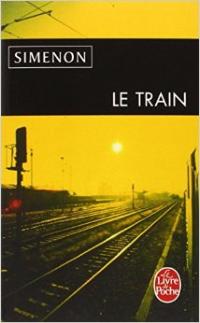|
Marcel knows when to
pack up and leave because he hears the military chatter and foreign broadcasts
on his radio, but of course the 'bush telegraph' has it in the air, in the
street, the alarm passing quickly through the neighborhood as military traffic
passes by. Marcel takes his wife Jeanne and daughter Sophie to the station,
where they become separated by the ancient dictum of "women and children"
first; pregnant Jeanne and Sophie with her blue doll board a carriage near the
front, while Marcel is lucky to get a cattle car at the back. He's not bothered
by this, but rather exhilarated by the prospect of this adventure into the
unknown. Besides, some Belgians arrive in another train, and one of them -- a
pretty young woman in a black dress -- quickly crosses the tracks and jumps
into his carriage.
"...on top of her,
the both of us as silent as snakes"
Sex in the boxcar, in
a field, in a tent... sex on a fishing boat... and in the desperate hours of
their flight, the sounds of sex everywhere in the darkness, as people console
themselves in the shadow of death. It's not Sodom and Gomorrah. Somehow it's
all a lark, a liberation from the normal world. It's cold in the boxcar at
night, warmth is another body, and the only privacy is darkness. Marcel hears
Julie -- a buxom local cafe owner -- get it on with another man he prefers to
call 'The Horse Dealer' (even if he isn't). "I knew the exact moment of
penetration," he notes, as the night grows more pornographic.
So, as usual, Simenon
has a strong sexual undercurrent in his writing. It's not Lady Chatterly but
raunchy for the times. Young readers might find this odd, as they have no idea
about censorship in the English language world before the 1960s, would say the
sex here is tastefully understated. Well it is, yet the truth of it would've
made this book unpublishable in English before the sixties. The French, you
know. Their continental liberalism was a barometer of decadence for the English
world... 'French Letters'... liaison... ménage à
trois, etc. No wonder Henry Miller was an admirer of Simenon's
writing.
Simenon was for a long
time involved in a ménage à trois with his wife and housekeeper,
so he was familiar with the psychology of such an arrangement. Of course
there's a seedy feel to such activities whereas affairs that happen during
prolonged separation have a more romantic aura. Such is Simenon's skill as a
scenarist that when he mixes the reprehensible with the excusable, he makes the
cheating Marcel a sympathetic character -- even a romantic hero -- despite his
rather dull c.v. A radio repairman who needs bifocals to see the world? A
weakling who was never drafted and has little experience of the world beyond
Fumay? Yet his childhood was tragic, although perhaps not an uncommon one for
many French children scarred by WW 1. His alienation, his
compartmentalization -- which Anna remarks upon -- aides him in his odd
casting in this fated love story. It's a measure of Simenon's superb talent as
a writer and explicator of the human condition that he makes us accept Marcel's
commitment to a stranger refugee when all his emotional and physical energy
should be devoted to reuniting with his pregnant wife and daughter.
And who is Anna? What
is her secret? Is she really Belgian? Was she really just released from a
women's prison in Nantes? She fears she will be mistaken for a German, perhaps
a spy, because of her accent... so she could be Flemish, whose Dutch inflection
could sound German, we think. We soon forget about this, as the young couple's
quest for survival distracts us, and them. The train stops for the night on a
siding somewhere in the country... troop trains pass... refugee trains... a
'lunatic's train' from an asylum... and sometime before dawn the cattle cars
are decoupled from the rest of the train, and Marcel awakes to find his wife
and child have disappeared, routed elsewhere in the confusion. A squadron of
German planes appear, strafe the train. The engineer is killed, passengers
too... many badly wounded. But Marcel's train continues, eventually arrives in
La Rochelle in south western France.
La Rochelle was
certainly a place that the boat-loving Simenon was familiar with. We wonder,
perhaps, if Simenon himself was anything like Marcel Féron. To some
extent, yes. Simenon was misdiagnosed with a terminal heart condition in
1940... and his ménage à trois was exposed. During this period he
and his family lived not far from La Rochelle so naturally he had a first hand
feel for the area and this period in French history, and the authenticity of
the story-line shows it.
"No past or future.
Nothing but a fragile present, which we sipped and savored together."
Although famous for
his plain language, Simenon has moments of poetic beauty, the sort of sensitive
inscaping that gets to the emotional reality of the situation... this affair,
this moment in history.
"We feasted
ourselves on little pleasures, on patterns of light and shade which we knew we
should remember all our lives"
The narrative is in
the 1st person, not Simenon's usual 3rd. You learn by the end that it's in fact
a journal or testament by Féron of what happened to him and his family
during the German advance, between May and June 1940, when Marshal Petain
signed the controversial armistice that ended hostilities. As a confession,
it's by no means docile, as Féron is proud that he was capable of such a
wild, other-worldly romance. It is, of course, ironic, as the true ending (when
it comes) is a real choker. Again, that Simenon ambiguity, that romantic sadism
that separates his work from the sentimentalists and liars.
© LR
2015
The Train at
Amazon:
US
|
Canada
|
UK
|
Australia
*Check out LR's
novel
RADIO
BRAZIL»»
|
